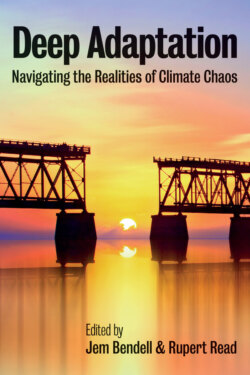Читать книгу Deep Adaptation - Группа авторов - Страница 18
A case for the virtue of scientific ignorance
ОглавлениеHow is it possible that a world of 4°C climate heating is judged to be uninhabitable or leading to societal collapse by some scientists (Steffen et al. 2018), but talked about in a professional matter-of-fact way by others, even seen as ‘optimal’ (Nordhaus 2018)? While the flaws and limitations of the economic approach are obvious, how can we understand the past reluctance of the IPCC to include worst-case scenarios and disruptive events or to accept the limits of its approach largely based on computer models?
Part of the answer may lie in the inherent tendency of professionals, such as climate scientists, to support the status quo (Schmidt 2000), something that clashes with the fact that averting a climate catastrophe requires society to change in radical ways, as advocated by some climate scientists (Rockström 2015). It is important to note that the change advocated is usually not radical enough to include a fundamental shift of the role of the scientists themselves. The possibility that climate science itself may have contributed to the current crisis, by overstating its knowledge and sketching out an often-theoretical road to solving the climate crisis, is seldom entertained. Evidence suggests, however, that climate policy makers and the IPCC have often co-created scenarios in which future, unproven technological solutions have provided justification for delaying action (McLaren and Markusson 2020).
It is obvious that climate scientists have done a generally pretty magnifficent job in trying to detail the way the world has changed and is now under threat. It is obvious that some climate scientists have had to put up with appalling attacks from ignorant or well-funded citizens, media or ‘think tanks’ (sic). It is obvious that a limited but increasing number of climate scientists have become near-heroes for speaking out about the extreme gravity of the threat hanging over our planetary ecosystem. And yet . . . Could climate science, insofar as it has tended not to be properly precautionary, have even, on balance, contributed to a widespread denial of the severity of the threat from global overheating? It is an awkward but necessary question to ask. One experienced climatologist explains that one way ‘we, as scientists, have contributed to the crisis concerns the excessive rationalization of a threat. In other words – we switch off common sense and produce scientific results borne of idealized models – be they mathematical or intellectual.’ He continues:
As citizens we all know the difference between a politician’s words and deeds and we are all painfully aware of . . . a very real risk of a 4 or higher degree of warming. And yet, the IPCC’s various assessment reports have repeatedly relied on highly idealized so-called integrated models that know and admit nothing of these things, and therefore [are] easily bent to produce results that fly in the face of common logic. (Knorr 2019)
Despite the existence of such criticism from within the climate science profession, at the time of writing it has proved to be largely unable to acknowledge the limits of its own approach to knowing about the climate crisis. It appears that the scientific community, while it continues to own the issue of global heating, does not own or abide by the fundamental importance of the precautionary principle for the functioning of human society. There is, however, a radically different approach that can be traced back almost two and half millennia to the ancient Greek philosopher Socrates, who taught the virtue of ignorance; of admitting what we don’t know and don’t understand. Collapse of complex systems such as human society is a chaotic process that we cannot fully understand, nor predict precisely through the scientific method. There are, to say the least, severe limits to what climate science can tell us about (say) the likelihood of ‘populists’ being elected who undermine climate sanity, or even about the likelihood of famines (which are going to be unprecedented in their nature, this century, as we move into the unknown – and which are always political events as well as ‘natural’ disasters).
Thus our emphasis above on the precautionary principle, properly understood, as decisive in cases of potential ruin. However, in scientific discourse, there is little room or incentive for admitting a significant level of ignorance. This may have contributed to a widespread and mistaken sense that the climate crisis is somehow under control. To emphasize probabilities rather than certainties from statistical calculations is not an effective way of accepting an inescapable ignorance. Rather, uncertainty within statistical methodology is widely translated into the message, whether by scientists or others, that an outcome is less than certain in the real world; and thus perhaps can be hedged or hoped against. Yet the important insight is that the method and language of science is unable to help us reach confident conclusions about highly complex systems (Servigne and Stevens 2020), and that this underscores rather than undermines the vital importance of taking rapid, profound, emergency action. Reaching and enacting conclusions is incredibly important on such matters, where the consequences are so immense; such conclusions should be reached on the basis of precaution, ethics and science, not ‘outsourced’ to science alone, which will be too slow, too conservative, too technocratic and too technocentric (Read 2020).
